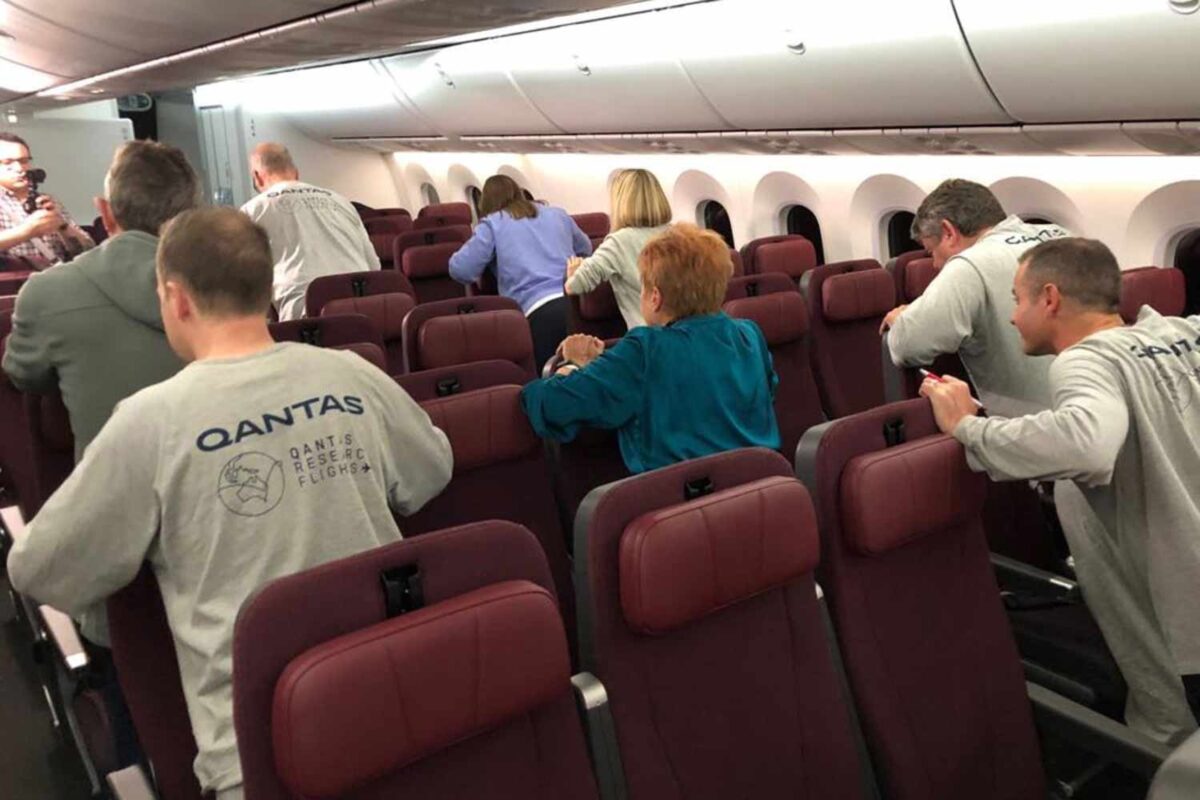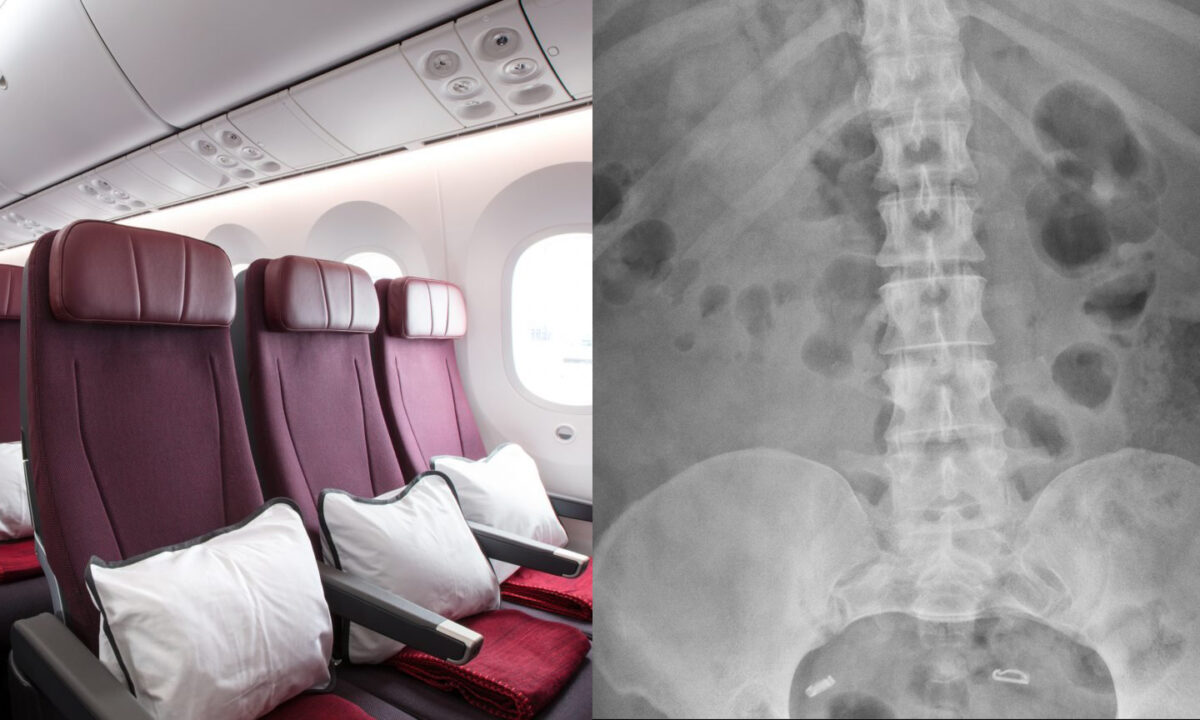Airlines are flying passengers ever longer distances across the world, touting benefits in efficiency, stopover stress (or rather, the lack of it) and saving time. But what do ultra long haul flights do to your body?
Long haul flights are brilliant but evil. If you are stuck in cattle class, like the bulk of us, you’ll know the experience is all elbows, knees, spilt food; sore neck. Not to mention stiff legs. Oh, and did we mention the sense of helplessness you get when you wake up from a nap, thinking you’re nearly there, only to realise you’re barely halfway? Yeah, that one’s a doozy…
Flying 14-15 hours to Dubai or Doha used to be the longest flight most of us would take from Australia (without a stopover). But now there are non-stop routes from Perth to London (and Peth to Rome), in the 16-18 hour range. There are also flights of a similar length to Dallas from Sydney. On top of that, Qantas plans to eventually operate even longer flights, such as from Sydney to London and Sydney to New York flights. These flights, part of Project Sunrise, will be in the 19-20 hour range.
Ultra long haul flights are considered flights of 16 hours or longer. So the flights mentioned above are well and truly ‘ultra long haul.’ But what do they do to your body? DMARGE did a little digging; here’s what we found.
The first risk of a poorly managed ultra long haul flight is dehydration. This is because cabins are dry environments, usually less than 20%, a figure which puts them at a similar humidity (not heat, thank god) to the Mojave Desert in California, or the Australian Outback. This dry air, with the reduced levels of oxygen you normally get on a flight, are prime conditions for dehydration – especially when you’re smashing coffees, teas and beers.
As one physio told Marie Claire, during a 10-hour flight, the average woman could lose 1.6 liters of water, with men losing about 25% more. Though you are very unlikely to die from dehydration on a flight, these conditions make you a ripe target for irritability and tiredness, and also makes you more liable to pick up a bacterial or viral infection, because your mucous membranes are drier than usual.

After dehydration, there are a number of other ways an ultra long haul flight might impact your health. One of them is hypoxia. Though hypoxia does not have a noticeable impact on a healthy person at the sort of altitudes commercial flights fly at, those with underlying medical issues like arterial or lung disease may experience an impact on their respiratory function when flying ultra-long haul.
On top of that, as Gordon Cable, head of aerospace medicine training for the Royal Australian Airforce, told the AFR for an article earlier this month: “Anaemia or low iron can mean the blood cells aren’t transporting oxygen well enough and symptoms of mild hypoxia may become noticeable, making the person a little tired, short of breath with a headache or brain fog.”
“Mild hypoxia also affects the architecture of sleep, impacts the taste of food and exaggerates the effects of alcohol. This is another good reason to limit alcohol, apart from its associated immobilisation and DVT risks.”
Gordon Cable
Speaking of DVT, deep vein thrombosis is yet another challenge ultra long haul flights pose to your body. Though, for most people, the risk of DVT is very low, the longer you fly for, and the longer you stay immobilised, the greater your chances of it happening. DVT is a blood clot that happens in a deep vein, often in the leg.
Being overweight, having a family history of DVT, having recently been pregnant, taking the oral contraceptive pill, or having spent a lot of time on bed rest (as well as certain other factors) can increase your risk of DVT. In order to reduce your risk of DVT, experts recommend taking regular walks around the cabin (once every two hours), lifting your feet up to make circles, and wearing compression stockings.
RELATED: Scientists Have Discovered Why Jet Lag Feels Worse When Travelling From West To East
Other ways in which Very Long Flights impact your body include your sense of taste being diminished, your skin getting dry and your stomach getting gassy. Some also warn you are exposed to radiation (from space) when you fly. Though this is true, unless you are a pregnant flight attendant (in which case, Quartz suggests, you might want to schedule-switch to avoid ultra long haul flights) you should be fine.
As Quartz reports: “For most occasional passengers, it’s not really a consideration. Pilots and crew members, however, are exposed to so much radiation that they’re officially considered radiation workers by the US Centers for Disease Control, with the largest average annual effective dose of all American radiation-exposed workers.”

Quartz adds: “One domestic US coast-to-coast flight exposes each passenger to about 0.035 mSv (3.5 mrem) of cosmic radiation, or less than a single chest x-ray—so, unless you’re flying almost every day, it isn’t really worth worrying about.”
All in all, ultra long haul flights are a bit worse, but not that much worse than the long haul flights we are already used to. It’s also worth noting that airlines like Qantas have done a lot of research into the impacts of ultra long haul flights on passengers’ wellness, and are providing ways to mitigate the effects, with features like well-being zones where you can go to stretch, move and hydrate. Qantas also provided passengers with tips on things like jetlag and on how best to look after themselves during the flight, on the test Project Sunrise flights they have done.
Qantas also draws on research into the mitigation of jetlag and the maximisation of passenger well-being when it comes to how they design (and time) their lighting, heating, meal times and water bottle hand out times on ultra long haul flights. So if you weigh it all up, and are already a reasonably healthy person, skipping that stopover could certainly be worth it, if you value convenience and time-saving.
Ultimately, though, it’s your choice. And you can always have a crack at these CIA-approved jetlag avoiding tips if you still feel foggy…
Read Next
